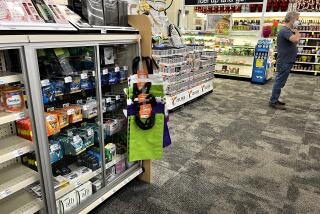Stores Driving Shoppers to Buy at Home : Retail: A survey suggests poor service is spurring electronic alternatives. Spiegel, Time Warner announce joint channel venture.
- Share via
NEW YORK — High levels of frustration over service and concerns about safety at stores are laying the groundwork for increased consumer interest in electronic home shopping, according to a survey issued Monday by the National Retail Federation.
The report by the Washington-based trade group comes at a time when several major retailers are on the verge of launching home shopping ventures, and others--previously ambivalent about the idea--are beginning to consider electronic projects. It was released at the federation’s annual conference.
Also on Monday, Spiegel Inc. and Time Warner Entertainment formally announced a joint home shopping channel, called Catalog 1, aimed at upscale shoppers. The channel will begin broadcasting in March in four markets that Spiegel Chairman John Shea said will be named later.
Of the 502 respondents in the national survey--the first to explore this topic--62% said they decided to buy a product in a store in the past six months but left without buying anything because sales clerks were not available when needed. Also, only 25% said they believe shopping malls provide a safe and secure shopping environment.
These complaints were particularly prevalent among television and computer shoppers and may have led to alternative shopping methods, said Watts Wacker, spokesman for Yankelovich Partners, which conducted the survey sponsored by Mastercard International.
“Stores are driving away customers,” Wacker said. “Currently, about 10% of households engage in electronic shopping. We predict that by 1996, 40% of households will engage in electronic shopping. . . . Americans are losing their technophobia. More and more of them view technology as a tool to make life easier.”
Home shopping channels such as QVC and Home Shopping Network, infomercial producers and computer shopping operators racked up more than $3 billion in sales in 1993, and the category is experiencing a 20% annual sales increase. However, electronic home shopping accounts for less than 1% of total retail sales.
*
Projections about the future of electronic shopping vary widely. Some say home shopping will grow to $30 billion within the next 10 years, while others say there will be annual sales of $250 billion within that period.
Many of those projections are inflated, some retail industry analysts say.
“Television retailing has a long way to go before it becomes a formidable challenger to store-based retailers,” said Kurt Barnard, a New York-based retail economist. “Billions of dollars are being spent on electronic projects, and there will be some major disappointments.”
Carter Hawley Hale President David Dworkin, in an interview at the convention, said the company--which owns the Broadway stores--is exploring the possibility of an interactive project.
Dworkin had expressed little interest in electronic shopping in the past.
*
Nordstrom has plans to develop an interactive channel, and R. H. Macy--operator of Bullock’s department stores--has a joint venture project with “60 Minutes” producer Don Hewitt to launch a shopping channel.
In addition, May Department Stores--operator of the Robinsons-May chain--is considering home shopping ventures.
Home Shopping Network has announced it will launch a second channel this summer, called Television Shopping Mall, targeting upscale shoppers. QVC Network also is starting the upscale channel Q2 in May.
Sears merchandising chief Arthur Martinez told the convention Monday that Sears would soon launch infomercial programs in a joint venture with TV game show developer King World. Sears will also explore possible small-scale electronic projects, he said, but the giant retailer remains somewhat guarded.
“There may be small bets by Sears in electronic shopping, but we won’t bet the farm,” Martinez said.
More to Read
Inside the business of entertainment
The Wide Shot brings you news, analysis and insights on everything from streaming wars to production — and what it all means for the future.
You may occasionally receive promotional content from the Los Angeles Times.










